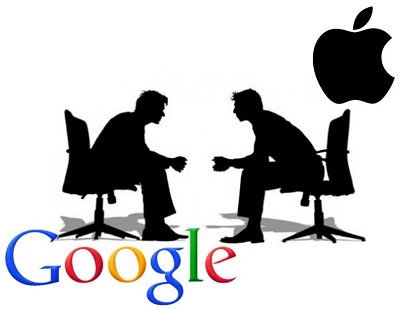These two technology giants have agreed to stop suing each other and to work together for systemic reforms.
Google and Apple have now come to an agreement that will enter them into a ceasefire within their mobile patents war, in which neither of them will sue the other and in which they will both work together in the effort to encourage patent system reforms in the United States.
The current truce is one of the outcomes of a massive trial that started back in 2010 between the two.
In that year, the trial in which Apple had sued Motorola Mobility was started. The latter company is the hardware manufacturer that was purchased by Google in order to divide it up and sell off its parts, maintaining a boatload of technology and mobile patents. As a result of the way that the lawsuit played out, a joint statement from the two companies now reads that “Apple and Google have agreed to dismiss all the current lawsuits that exist directly between the two companies.” It added that “Apple and Google have also agreed to work together in some areas of patent reform. The agreement does not include a cross license.”
It appears that some of the mobile patents lawsuits from Apple will continue, though not directly against Google.
 The wording of the statement that was made by the companies indicates that the lawsuits that are underway from Apple against mobile device manufacturers that are using the Android operating system, from Google, would not cease. This includes the patent suit opened by Apple against Samsung that has brought about two massive headline making trials in San Jose, California, as well as comparable legal battles occurring in other nations.
The wording of the statement that was made by the companies indicates that the lawsuits that are underway from Apple against mobile device manufacturers that are using the Android operating system, from Google, would not cease. This includes the patent suit opened by Apple against Samsung that has brought about two massive headline making trials in San Jose, California, as well as comparable legal battles occurring in other nations.
In both of the high profile trials against Samsung, Apple has come out the winner. However, the second judgment’s damages were notably lower. It was in that second case that newer Samsung mobile devices were included.
The lawsuits against many of the companies using Android were carrying out a vow by Steve Jobs, the late CEO of Apple, in which he said that the company would go “thermonuclear” against Google for having copied the iOS for the iPhone in what he referred to as “grand theft.”. That statement was revealed in the Walter Isaacson biography of Jobs which was published after the Apple co-founder’s death.
Wearable devices could be having a problem with their image
Wearable technology has been growing in popularity, but not always because of good reasons. Wearable devices are gaining attention throughout the world because they are being marketed as somewhat revolutionary. Some of these devices can, quite literally, change the way you see the world, while others simply offer you a better way to keep track of your health and other basic information. Some devices are being lauded as tools that could change the way society, as a whole, interacts with itself. The issue, however, is that none of these devices have yet become successful.
What is going on behind the scenes in the technology world may determine the future of wearable devices and their image with the public. Recently, Nike laid off many of the members of its FuelBand team. The FuelBand is a sort of smart wristband that is meant to track physical activity. Nike claims that it will continue providing support for the device, but rumors concerning the FuelBand’s imminent demise have already begun to circulate. While Nike may, indeed, have plans to continue supporting the device, the image that the FuelBand has created for itself may end up affecting its future.
Consumers may be somewhat disinterested in wearable devices
 Similar things are happening to other wearable devices as well. The majority of these devices may end up be affected by rumors much more than the FuelBand, however, as most of these devices have not yet been released. Products like augmented reality glasses are often presented as devices that can change how people see the world, but these devices have also been shrouded in controversy. Google’s forthcoming Glass platform, for instance, has run afoul of many lawmakers in some parts of the United States. These legislators suggest that the device will be distracting for drivers and could lead to serious privacy issues. Beyond that, Google had earned some notoriety in the past for constantly changing the features of the Glass platform, initially noting that it would including augmented reality technology, then claiming that it would not support the technology.
Similar things are happening to other wearable devices as well. The majority of these devices may end up be affected by rumors much more than the FuelBand, however, as most of these devices have not yet been released. Products like augmented reality glasses are often presented as devices that can change how people see the world, but these devices have also been shrouded in controversy. Google’s forthcoming Glass platform, for instance, has run afoul of many lawmakers in some parts of the United States. These legislators suggest that the device will be distracting for drivers and could lead to serious privacy issues. Beyond that, Google had earned some notoriety in the past for constantly changing the features of the Glass platform, initially noting that it would including augmented reality technology, then claiming that it would not support the technology.
One of the most significant challenges facing wearable technology has to do with the apparent lack of interest that consumers have for these devices. While wearable devices have become very popular among tech-savvy individuals, most people have not yet been convinced that these devices are interesting in any way. Marketing that has focused on the vague, innovative aspects of these devices has yet to thrill the majority of people that already have smartphones or tablets.
 The wording of the statement that was made by the companies indicates that the lawsuits that are underway from Apple against mobile device manufacturers that are using the Android operating system, from Google, would not cease. This includes the patent suit opened by Apple against Samsung that has brought about two massive headline making trials in San Jose, California, as well as comparable legal battles occurring in other nations.
The wording of the statement that was made by the companies indicates that the lawsuits that are underway from Apple against mobile device manufacturers that are using the Android operating system, from Google, would not cease. This includes the patent suit opened by Apple against Samsung that has brought about two massive headline making trials in San Jose, California, as well as comparable legal battles occurring in other nations.
 Similar things are happening to other
Similar things are happening to other 